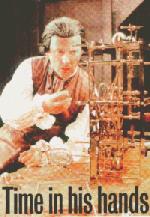 As
we have long been reminded, the new millennium is approaching. In less than
365 days we shall be party to the beginning of the next thousand years of
Earth's life, and the BBC is marking the countdown with Time Season, a series
of programmes exploring the philosophy, history and uses of time. Who has
heard of John Harrison? Airline pilots, probably.
And captains of cruise liners.While promoting Longitude, a
Horizon special, actor Patrick Malahide even met
astronaut Joseph Conrad, veteran of two Gemini missions and Apollo XII, who
told him that he was a Harrison devotee.
As
we have long been reminded, the new millennium is approaching. In less than
365 days we shall be party to the beginning of the next thousand years of
Earth's life, and the BBC is marking the countdown with Time Season, a series
of programmes exploring the philosophy, history and uses of time. Who has
heard of John Harrison? Airline pilots, probably.
And captains of cruise liners.While promoting Longitude, a
Horizon special, actor Patrick Malahide even met
astronaut Joseph Conrad, veteran of two Gemini missions and Apollo XII, who
told him that he was a Harrison devotee.
"Anybody who knows anything about navigation will know of him,"
says Malahide. John Harrison solved possibly the greatest scientific challenge
of the 18th century: measuring longitude accurately. Before his success,
sailors had known their latitude, from the angle of the sun, but not how
far east or west they had travelled. Setting sail back then," says Malahide,
"would be like taking a jumbo jet up today without an altimeter. They were
absolutely busking it."
In 1707 a British fleet returning from war misjudged its position
and foundered on rocks, sacrificing 2,000 lives.It prompted the government
to offer a prize of £20,000 equivalent to £6million today to anyone
accurately measuring longitude. Astronomers pompously believed that they
alone would succeed, but it took Harrison, a carpenter-turned-clockmaker
from remotest Lincolnshire, to realise that time was the key and to build
a clock reliable enough.
The Horizon special
tells Harrison's story as popularised in the scientific bestseller Longitude,
by Dava Sobel using interviews with experts and a
dramatisation starring Malahide as the unlikely hero.
Another programme in the season answers such questions as why
tooth pain is lowest after lunch and why we urinate less at night. It's all
to do with our internal body clock, or Circadian Rhythm, the subject of What
Makes Us Tick (Saturday 9 January). Our body clocks run on 24.6-hour
cycles and are reset by daylight (60 per cent of registered blind people
have serious sleeping problems). And trying to fight against our body clock
can have serious consequences: there is a peak of car and air crashes at
3am, and shift workers live, on average, ten years less than other workers.
BBC2's documentary follows scientists trying to pinpoint the
area in our brains responsible for Circadian Rhythm. They needed mutant animals
whose body clocks were malfunctioning, to isolate the tissue responsible
and, by chance, they found a family from California, three generations worth,
who all woke up at 3am and went to bed before 9pm, their body clocks 4.5
hours out from the rest us.
Scientific developments in this field could mean we can avoid
jetlag, aid the blind, swat flies and win wars. Flies' brains, it transpires,
work in fast-forward, so that everything we do appears in slow motion to
them, a perception which, if harnessed by
 soldiers, could make all the difference in war. Then, on Wednesday
, The Flow of Time looks at our perceptions of
time. While we think of the past, present and future as distinct entities,
some scientists tell us otherwise. Events that took place a millennium ago
or in the future are actually happening "now" but on a different time scale
known scientifically as space-time
Doctor Who fans will be familiar
with the concept and the documentary indeed suggests that we will one day
master time travel.
soldiers, could make all the difference in war. Then, on Wednesday
, The Flow of Time looks at our perceptions of
time. While we think of the past, present and future as distinct entities,
some scientists tell us otherwise. Events that took place a millennium ago
or in the future are actually happening "now" but on a different time scale
known scientifically as space-time
Doctor Who fans will be familiar
with the concept and the documentary indeed suggests that we will one day
master time travel.
Nick Griffith
Also in BBC2's Time Season . . . Clockwatch (Monday and Wednesday). a series of short visits to famous clocks; Century Road (Saturday 9 January), one hundred years traced through a row of houses; Time Management (Saturday 9 January), an askance look at Americans organising time.